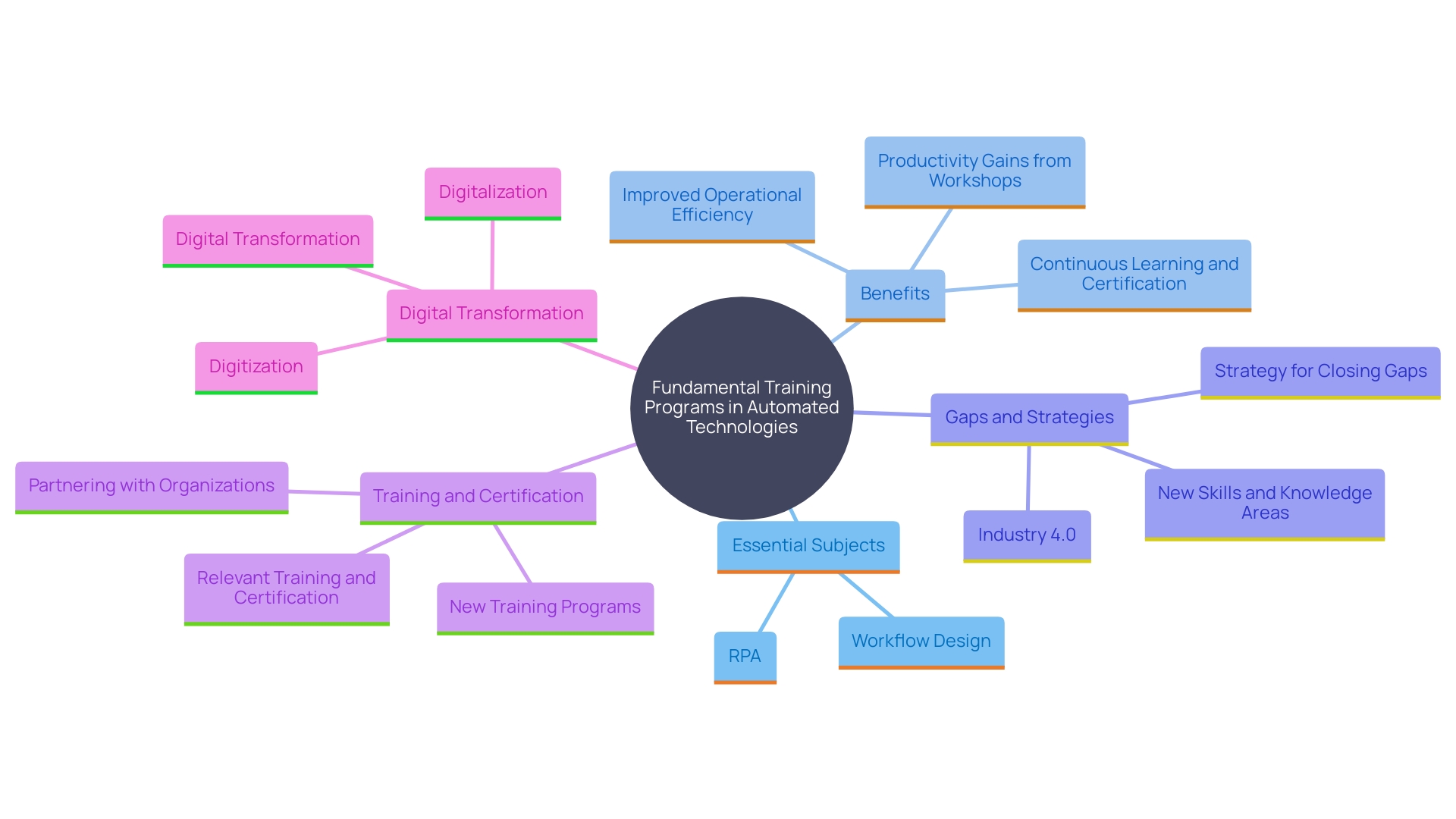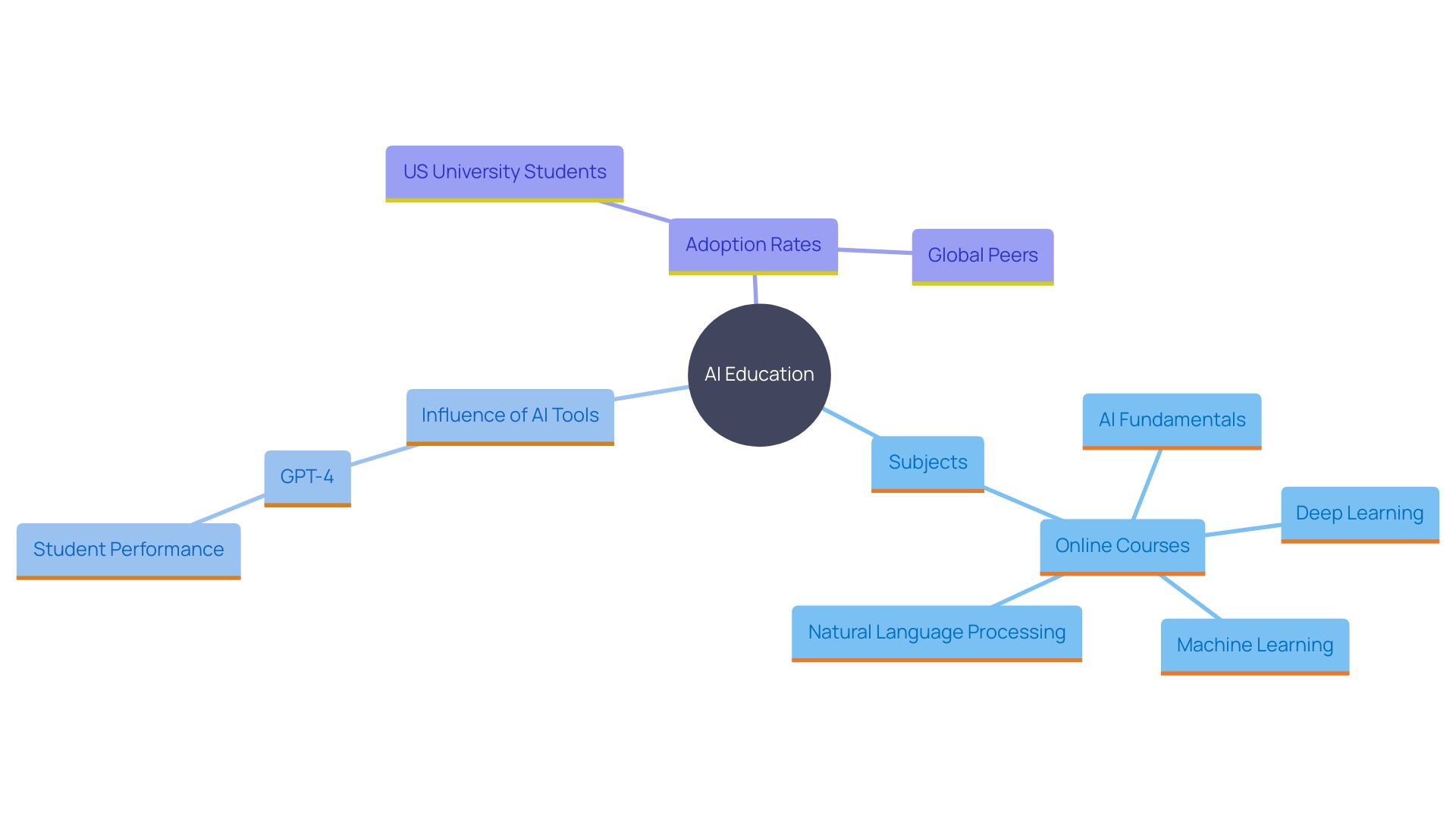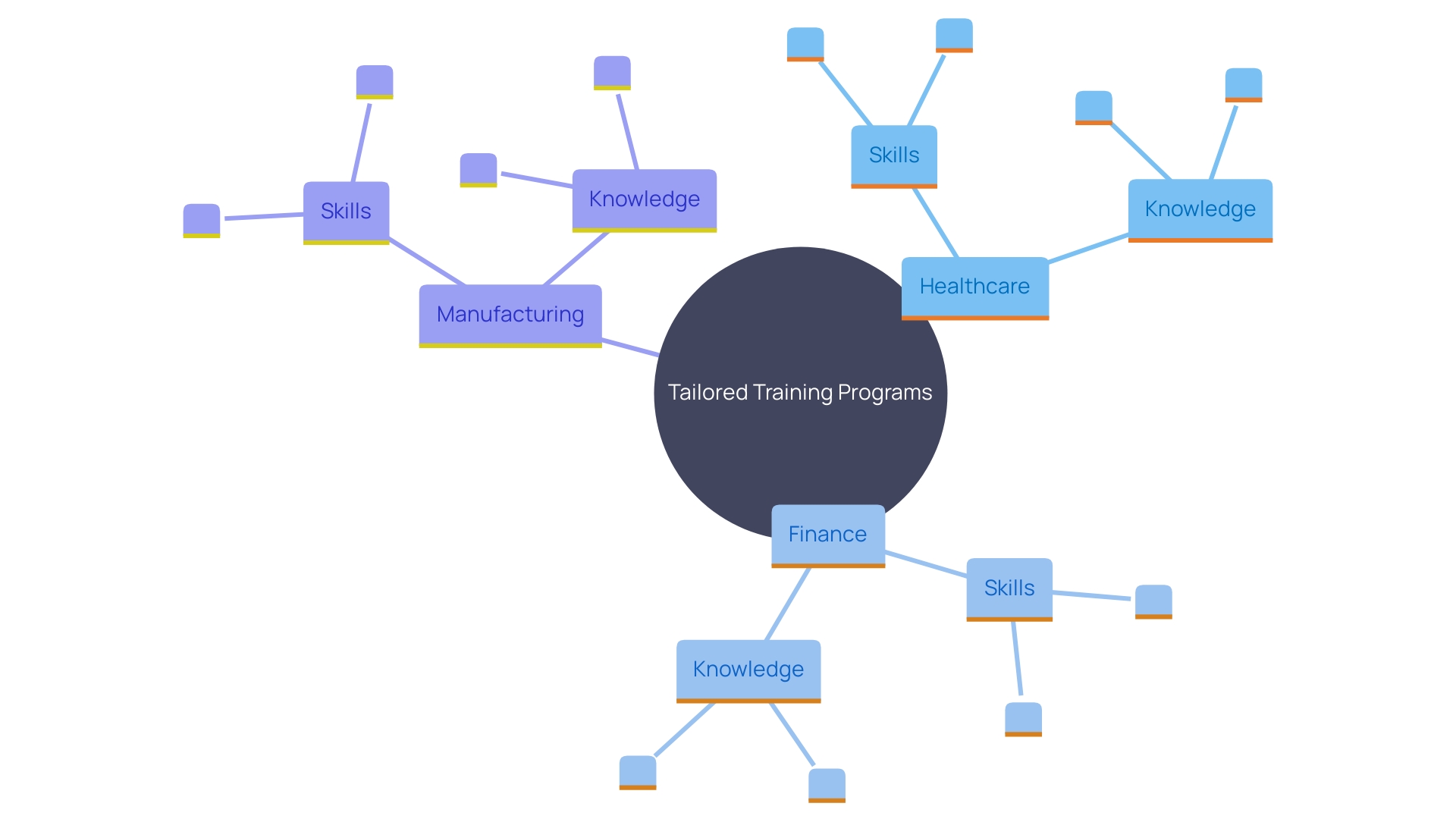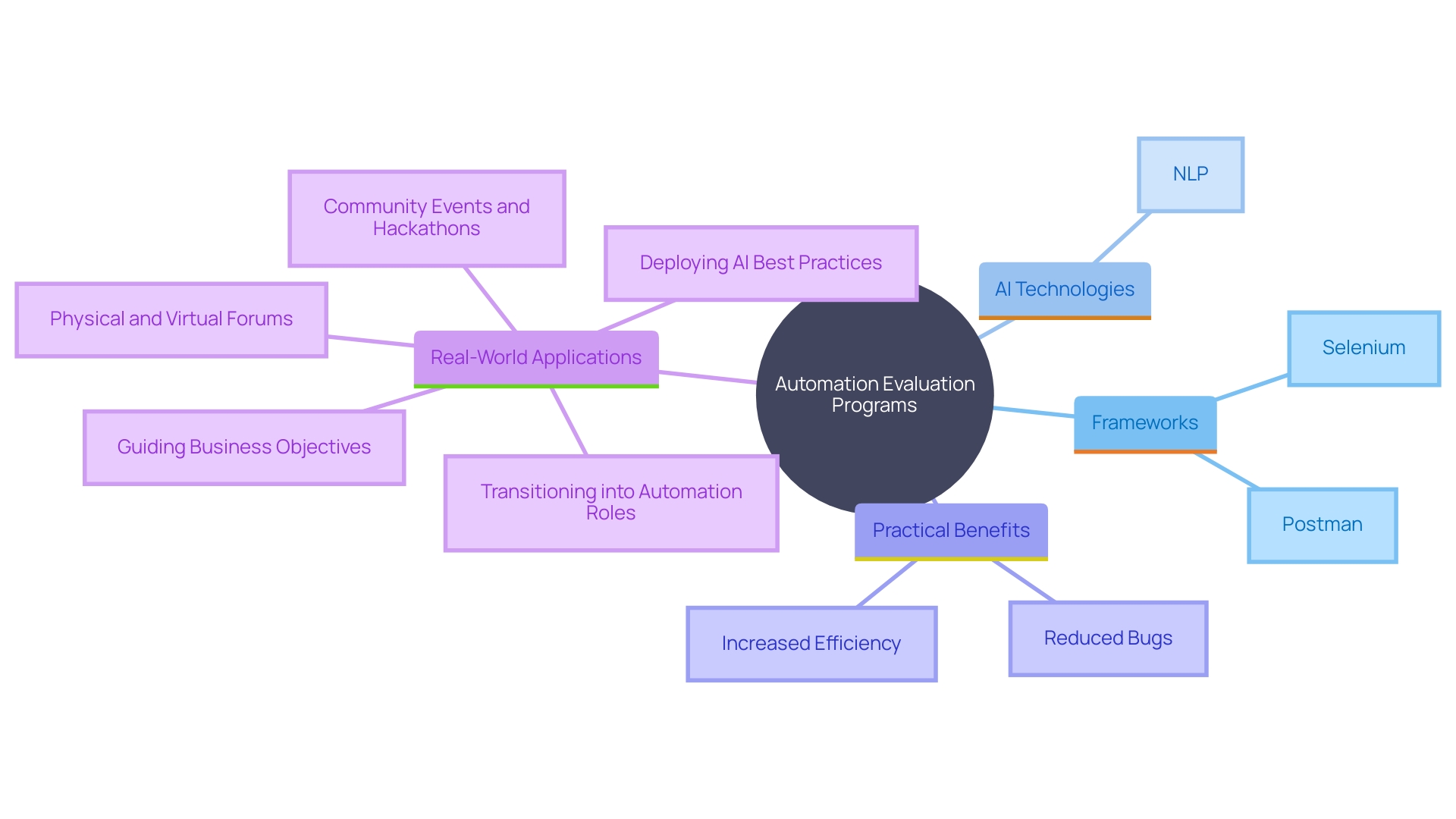Introduction
In today’s rapidly evolving technological landscape, operational efficiency is paramount for organizations striving to maintain a competitive edge. As automation technologies continue to transform business processes, mastering these tools has become a critical skill set. This article explores a comprehensive range of automation courses designed to equip professionals with the knowledge and expertise needed to excel in this dynamic field.
From foundational courses that cover the basics of robotic process automation (RPA) and workflow design to advanced programs for programmers and developers, and specialized training tailored to specific industries, there is a wealth of opportunities for continuous learning. Additionally, the availability of free AI and automation courses from reputable universities and targeted automation testing courses ensures that quality assurance professionals can keep pace with the latest advancements. By engaging in these educational opportunities, individuals can significantly enhance their operational efficiency, reduce errors, and streamline processes, ultimately driving their organizations toward greater success.
Foundational Automation Courses
Fundamental training programs are essential for anyone striving to master the core principles of automated technologies. These courses explore essential subjects such as robotic process automation (RPA), workflow design, and the transformative effect of technology on business operations. By understanding these foundational elements, participants can anticipate significant improvements in operational efficiency, error reduction, and streamlined processes.
For instance, the Postman Academy’s workshops have demonstrated how foundational learning can lead to substantial productivity gains. After attending the API/QA Engineer 101 workshop, users tripled the number of collections they created and updated collections 31 times more frequently in just three months. This highlights the tangible benefits of engaging in structured learning environments.
Furthermore, the significance of the field’s growth is highlighted by data indicating that ticket sizes fell by an average of 16% among firms utilizing automated tools, with an 8% decrease in cycle times. This illustrates the efficiency improvements attainable through proper training in automated processes.
Industry leaders also emphasize the value of continuous learning and certification. As one report indicates, over 50% of surveyed professionals in the technology sector already hold certifications, with many more intending to pursue further qualifications. This commitment to ongoing education is vital for staying competitive in an evolving technological landscape.
Participating in basic training programs not only establishes the basis for additional specialization but also provides individuals with the abilities required to navigate and thrive in a future influenced by automated processes.

Advanced Automation Courses for Programmers and Developers
For individuals with a programming background, advanced training sessions provide a thorough examination of technical processes. These courses often emphasize best coding practices, sophisticated RPA tools, and seamless integration of automated solutions within existing IT infrastructures. Participants gain expertise in crafting custom scripts for automated processes, implementing AI-driven solutions, and optimizing workflows using various programming languages. This knowledge is essential for developing sophisticated systems that address intricate business challenges. By utilizing advanced mechanization technology, programmers can create more efficient, precise, and dependable processes, ultimately freeing up time and resources for more strategic tasks.
Free AI and Automation Courses from Reputable Universities
Renowned institutions worldwide now provide complimentary online classes in AI and technology, granting access to top-notch education guided by professionals in the field. These courses encompass a wide range of subjects, from machine learning and data analysis to specific automation methods and techniques, and include lectures, practical exercises, and evaluations. For instance, researchers carried out an extensive study involving 5,831 students from 146 nations enrolled in an online coding class, analyzing the effect of AI systems like GPT-4 on student performance and engagement. While results showed mixed outcomes, those who actively used the AI chat application demonstrated potential improvements in exam scores.
The availability of AI-driven resources is expanding rapidly, yet research on their impact on student learning, particularly in technical fields like coding, remains limited. Studies suggest that providing students with AI resources can support their learning and engagement, though further investigation is needed to optimize their integration into educational settings.
In a recent survey by EdTech company Anthology, it was revealed that U.S. university students have been slower to adopt generative AI resources compared to their global counterparts. This indicates an opportunity for educators to prepare for increased usage and to better understand the capabilities and limitations of these AI tools. By leveraging these free online resources, individuals can gain valuable skills that are increasingly in demand in the job market, enhancing their career prospects.

Specialized Automation Courses
Tailored training programs are carefully crafted to satisfy the distinct requirements of different sectors, such as healthcare, finance, and manufacturing. These programs equip professionals with the essential abilities to execute automated solutions customized for their particular industries. Participants will gain insights into industry-specific technology tools, compliance regulations, and best practices, ensuring successful and efficient implementation. As Karmela Peček, an instructional designer at eWyse Agency, notes, “One of the challenges in developing this project was trying to figure out different ways of showing all the technical data in a way that was easy to follow. Our goal was to transform all the tables and schemes into new forms that would be interesting enough to motivate users to discover information on their own.” This targeted approach is crucial, especially in sectors like finance and banking, where international regulations around fraud protection and Anti-Money Laundering necessitate thorough training. By concentrating on particular applications and compliance requirements, these programs enable professionals to utilize automation effectively within their roles, resulting in reduced operational expenses, enhanced precision in repetitive tasks, and more streamlined workflows. This specialization not only enhances individual competencies but also aligns with global and local market requirements, ensuring that businesses remain competitive in the rapidly evolving technological landscape.

Automation Testing Courses
Automation evaluation programs are crucial for quality assurance specialists aiming to optimize their assessment procedures. These courses explore different evaluation frameworks, resources, and approaches, allowing participants to automate test scenarios, manage test settings, and efficiently employ assessment resources. For instance, the use of tools like Postman has shown to eliminate repetitive steps, saving significant time and effort. Furthermore, including AI technologies such as Natural Language Processing (NLP) improves test coverage and accelerates the evaluation process by automating repetitive tasks like test execution and result analysis.
The practical benefits of these courses are evident in real-world applications. For example, at California State University, using Postman in a structured manner has streamlined their processes, allowing for better collaboration and transparency within large teams. Furthermore, incorporating AI into software evaluation has demonstrated an increase in efficiency and a decrease in the number of bugs in production by as much as 60%, according to industry statistics.
Participants also gain from practical experiences, such as developing Selenium/Java test cases and utilizing tools like ChatGPT for automated processes. These practical components ensure that learners can apply their knowledge directly to their work environments, enhancing their ability to deliver high-quality software products efficiently.
In today’s fast-paced software development environment, utilizing automation evaluation is not just advantageous but crucial. By adopting these advanced testing techniques, quality assurance professionals can significantly reduce testing time, improve software quality, and stay ahead in the competitive market.

Conclusion
The exploration of automation courses reveals a multifaceted approach to enhancing operational efficiency across various sectors. Foundational courses provide critical insights into the principles of automation, empowering individuals to improve productivity and streamline processes. The tangible benefits of such education, as seen through increased output and reduced operational costs, underscore the importance of investing in foundational knowledge to thrive in an automation-driven landscape.
Advanced automation courses cater specifically to programmers and developers, equipping them with the technical skills necessary to tackle complex challenges through sophisticated automation solutions. This specialization not only enhances individual capabilities but also fosters the creation of more efficient workflows, ultimately allowing organizations to allocate resources toward strategic initiatives.
The availability of free courses from reputable universities further democratizes access to high-quality education in AI and automation. By embracing these resources, individuals can develop in-demand skills that enhance their career prospects while contributing to the ongoing evolution of the workforce in a technology-centric economy.
Specialized and automation testing courses round out the educational landscape by addressing specific industry needs and quality assurance processes. These courses ensure that professionals are well-equipped to implement tailored automation solutions and adopt advanced testing methodologies, leading to significant improvements in accuracy and efficiency.
In summary, engaging in a diverse array of automation courses is essential for professionals seeking to enhance their operational efficiency and stay competitive in an ever-evolving technological environment. By prioritizing continuous learning and specialization, organizations can harness the full potential of automation, driving sustainable success and innovation.

